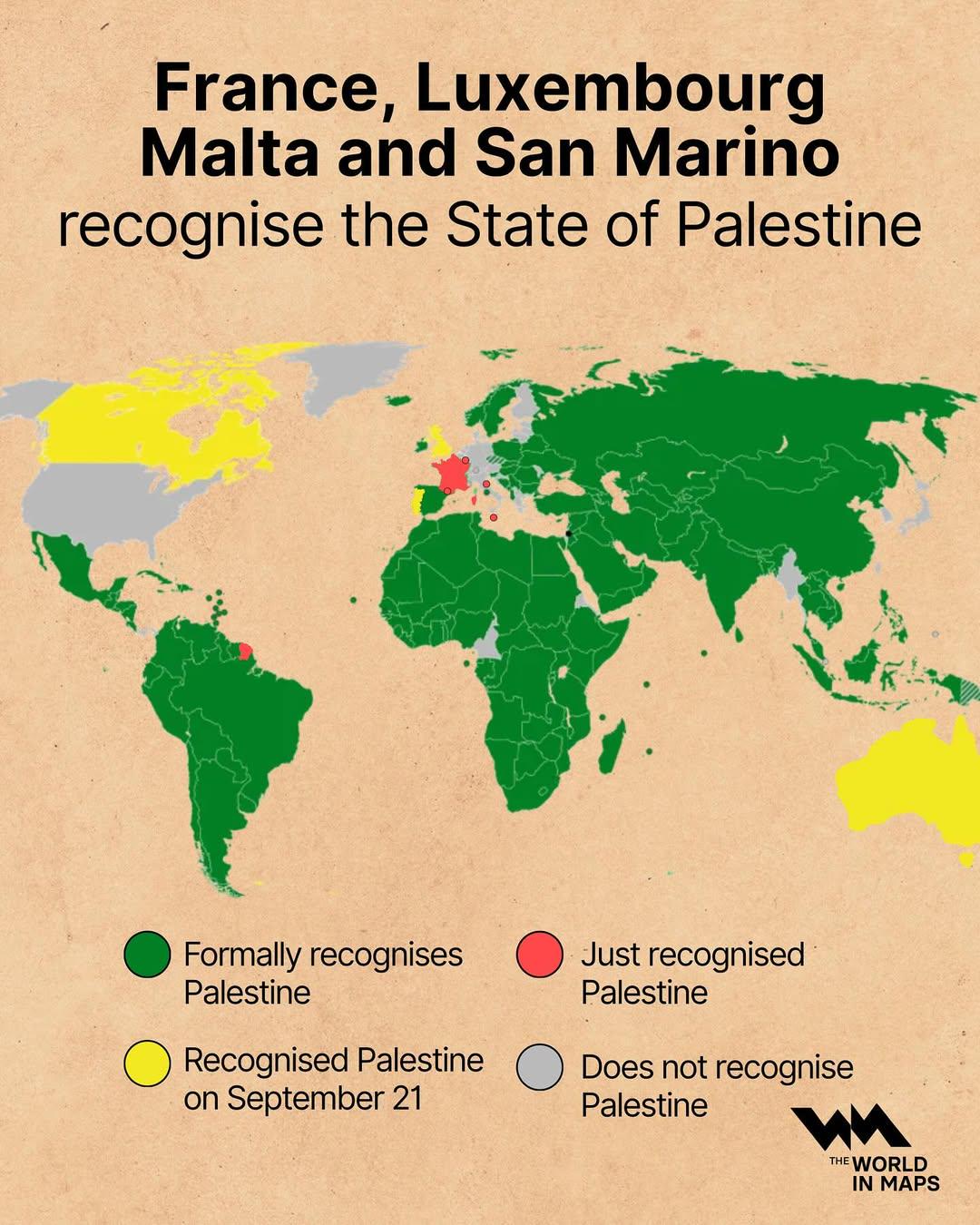

Marcus Rodriguez
Historical Geography Expert
Marcus Rodriguez specializes in historical cartography and geographic data analysis. With a background in both history and geography, he brings unique...
Geographic Analysis
What This Map Shows\nThis map illustrates the countries that have formally recognized the State of Palestine, specifically highlighting France, Luxembourg, Malta, and San Marino. Recognition of statehood is a significant geopolitical act, often impacting international relations, trade, and diplomacy. This visualization serves as a snapshot of current diplomatic stances regarding Palestine, a region whose political status has been a matter of contention for decades.
Deep Dive into Palestine Recognition\nThe recognition of Palestine as a state is not merely a political gesture; it reflects a complex interplay of history, culture, and international law. The State of Palestine was proclaimed in 1988, and since then, numerous countries have recognized it, often citing the right of self-determination for the Palestinian people. As of now, over 135 UN member states recognize Palestine, a figure that underscores the global divide on this issue.
Interestingly, many of the countries that recognize Palestine are in the Global South, particularly in regions like Latin America and Africa. However, Western nations have been more hesitant. Countries like France have had a long-standing policy of supporting Palestinian statehood as part of a two-state solution, which envisions both Israel and Palestine coexisting peacefully. Luxembourg and Malta also share this commitment, reflecting a broader trend among smaller EU states to advocate for human rights and self-determination.
The recognition of Palestine is often tied to sentiments about colonialism and the rights of indigenous populations. The Palestinian struggle has its roots in a historical context marked by displacement, conflict, and resilience. The recognition by these nations adds to the legitimacy of Palestinian claims in international forums, including the United Nations, where Palestine holds a non-member observer state status.
Moreover, the act of recognition can influence bilateral relations. For instance, countries that recognize Palestine may face economic and political repercussions from Israel and its allies, which can lead to diplomatic tensions. This dynamic creates a fascinating landscape of international politics where recognition can be both a symbolic and practical act.
Regional Analysis\nWhen examining the specific countries highlighted on the map, we can see distinct approaches to Palestine's recognition within Europe. France, as one of the larger nations in the EU, plays a pivotal role in shaping the discourse around Palestine. Its recognition is often framed within the broader context of advocating for peace in the Middle East.
Luxembourg, although smaller in size, has been vocal about its stance on human rights, aligning its foreign policy with support for Palestine. The same can be said for Malta, which has also positioned itself as a proponent of self-determination rights in international dialogue. In contrast, San Marino's recognition, while less influential on the global stage due to its small size, still contributes to the overall narrative of European support for Palestine.
What's fascinating is the juxtaposition of these countries against their larger European counterparts, many of which have yet to extend formal recognition. This discrepancy highlights the varying levels of commitment to international humanitarian principles and the complexities of European foreign policy.
Significance and Impact\nThe recognition of Palestine by these nations has far-reaching implications. It not only influences diplomatic relations but also affects humanitarian efforts and international aid. As Palestine continues to seek recognition and legitimacy on the world stage, the support from countries like France, Luxembourg, Malta, and San Marino plays a crucial role.
Moreover, this recognition aligns with broader global movements advocating for justice and equality. It signals a shift in international attitudes toward colonialism and self-determination, resonating with various struggles around the world. The ongoing conversation about Palestinian statehood continues to evolve, and these recognitions could pave the way for more extensive discussions in international forums.
In conclusion, the map serves as a vital tool to understand the geopolitical landscape concerning Palestine. As the world becomes increasingly interconnected, the acknowledgment of statehood will continue to be a pivotal issue in international relations. The actions of these countries reflect a commitment to human rights and the pursuit of peace, a goal that remains elusive but essential in the quest for a stable future in the region.
Visualization Details
- Published
- September 22, 2025
- Views
- 52
Comments
Loading comments...